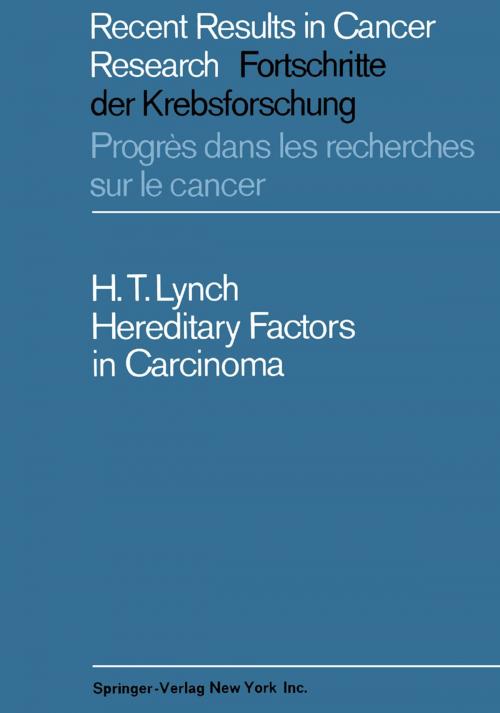Hereditary Factors in Carcinoma
Nonfiction, Health & Well Being, Medical, Medical Science, Genetics, Specialties, Oncology| Author: | Henry T. Lynch | ISBN: | 9783642482526 |
| Publisher: | Springer Berlin Heidelberg | Publication: | December 6, 2012 |
| Imprint: | Springer | Language: | English |
| Author: | Henry T. Lynch |
| ISBN: | 9783642482526 |
| Publisher: | Springer Berlin Heidelberg |
| Publication: | December 6, 2012 |
| Imprint: | Springer |
| Language: | English |
The writing of this monograph was stimulated on the one hand by experience gained in the study of "cancer families", and on the other, by the frequent perplexed and bewildered comments made by numerous physicians who have expressed amaze ment that we could think that "cancer is hereditary". In reviewing the world literature it became immediately apparent that no compendium on the subject of cancer genetics was available to the physician or research scientist. Therefore this monograph has been written for the following reasons: 1) To illuminate the problem for those who may have missed or ignored the evidence supporting a genetic etiology for certain malignant neoplasms; 2) to supply useful information to all practicing physicians regarding genetic risks to their patients; and 3) to provide new thoughts on the subject for use by cancer investigators. Finally, our paramount hope is that information gleaned through the reading of this monograph may contribute to the early dia gnosis of cancer in members of high risk "cancer families".
The writing of this monograph was stimulated on the one hand by experience gained in the study of "cancer families", and on the other, by the frequent perplexed and bewildered comments made by numerous physicians who have expressed amaze ment that we could think that "cancer is hereditary". In reviewing the world literature it became immediately apparent that no compendium on the subject of cancer genetics was available to the physician or research scientist. Therefore this monograph has been written for the following reasons: 1) To illuminate the problem for those who may have missed or ignored the evidence supporting a genetic etiology for certain malignant neoplasms; 2) to supply useful information to all practicing physicians regarding genetic risks to their patients; and 3) to provide new thoughts on the subject for use by cancer investigators. Finally, our paramount hope is that information gleaned through the reading of this monograph may contribute to the early dia gnosis of cancer in members of high risk "cancer families".















